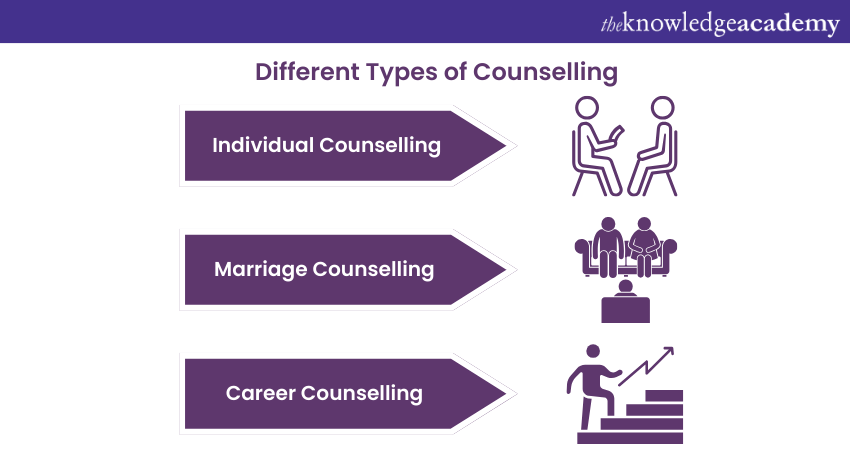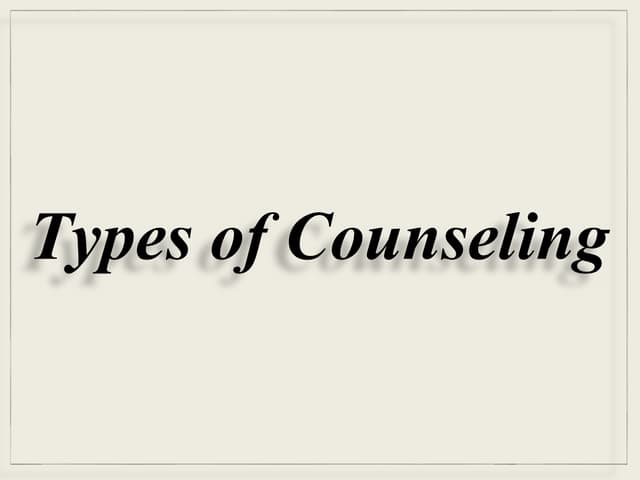A Comprehensive Guide to the Different Types of Therapy and Their Influence
Therapy encompasses a variety of restorative approaches, each developed to fulfill unique mental health and wellness demands. From the organized techniques of Cognitive-Behavioral Therapy to the compassionate nature of Person-Centered Treatment, these methods offer unique paths to individual development. Household treatment and Dialectical Behavior modification supply added structures for healing, while group counseling promotes neighborhood assistance. Understanding these varied approaches can illuminate their extensive impact on individual well-being. What continues to be to be checked out are the intricacies of each strategy.

Understanding Cognitive-Behavioral Therapy (CBT)
Although several therapeutic strategies exist, Cognitive-Behavioral Therapy (CBT) sticks out because of its structured, goal-oriented nature. This type of therapy is based on the property that thoughts, feelings, and habits are interconnected, and by transforming unfavorable thought patterns, individuals can change their psychological feedbacks and actions. CBT employs different strategies, such as cognitive restructuring, which helps clients determine and test distorted beliefs. Behavior activation urges engagement in pleasurable activities to combat depression.
Generally, CBT is a short-term therapy, frequently lasting between 12 to 20 sessions, making it available for those looking for fast outcomes. Its efficiency has been well-documented in treating anxiety disorders, depression, and other psychological wellness issues. The therapist's role is to direct clients with exercises and homework assignments, promoting self-awareness and advertising long-lasting coping strategies. This useful approach empowers individuals to take control of their psychological health, ultimately causing boosted life contentment.
Exploring Person-Centered Therapy
Person-Centered Treatment, developed by Carl Rogers, offers a different technique to Cognitive-Behavioral Therapy by emphasizing the client's subjective experience. This healing design prioritizes the person's point of view, fostering a setting of empathy, unconditional favorable regard, and credibility. By enabling clients to discover their sensations and thoughts without judgment, therapists promote individual growth and self-discovery.
The core tenet of Person-Centered Therapy is the idea that individuals possess the inherent capacity for self-healing and personal advancement. In this setup, the specialist functions as an encouraging overview rather than a directive authority, encouraging clients to organize their own trip. This method is specifically efficient for those facing problems such as reduced self-esteem, stress and anxiety, or depression, as it equips them to confront and comprehend their feelings. Ultimately, Person-Centered Therapy cultivates a solid healing alliance, promoting trust and openness crucial for meaningful modification.
The Duty of Family Therapy in Recovery
Family members therapy serves as a crucial component in the healing process for people and their partnerships. This therapeutic method concentrates on boosting interaction, solving problems, and fostering deeper connections among member of the family. By addressing inefficient dynamics, household treatment motivates each participant to share their ideas and feelings in a risk-free atmosphere, advertising understanding and empathy.

The influence of family treatment click here for info extends past the sessions, as improved connections can lead to improved psychological well-being for all included. why not look here On the whole, family therapy plays a vital function in recovery by fostering unity, strength, and shared assistance amongst member of the family, inevitably guiding them toward a healthier, much more meeting life together.
Unloading Dialectical Behavior Modification (DBT)
Structure on the structure of therapeutic methods that enhance emotional well-being, Dialectical Behavior modification (DBT) provides an organized framework for individuals dealing with intense emotions and behavioral challenges. Developed by Marsha Linehan, DBT incorporates cognitive-behavioral methods with mindfulness methods, intending to aid customers manage overwhelming feelings and boost social efficiency.
The therapy is particularly helpful for those identified with Borderline Character Disorder yet is additionally appropriate to an array of other psychological health issues. virtual therapy. DBT includes individual therapy sessions and skills training teams, concentrating on four key capability: mindfulness, distress resistance, emotion law, and social performance
The Benefits of Group Therapy Sessions
While specific therapy offers valuable insights, group therapy sessions supply special benefits that can significantly boost the restorative experience. One important benefit is the sense of area that emerges amongst participants. Individuals often find comfort in sharing their experiences with others facing comparable obstacles, promoting a helpful environment that reduces sensations of isolation.
Group sessions urge varied perspectives, permitting individuals to learn from each other's coping strategies and insights. This cumulative knowledge can bring about improved analytical capacities and a broader understanding of personal problems.
Additionally, team therapy commonly promotes responsibility, as participants encourage one another to pursue their objectives and abide by their commitments. Lastly, the cost-effectiveness of team treatment makes it an available choice for several individuals looking for support. Generally, the joint nature of group counseling sessions can greatly improve the therapeutic trip.
Regularly Asked Questions
What Credentials Do Specialists Need to Exercise Counseling?
Therapists normally call for a pertinent degree in psychology or therapy, in addition to supervised medical experience. Furthermore, they page need to get proper licensure or accreditation to exercise lawfully, ensuring adherence to specialist criteria and moral guidelines.
Exactly how Do I Choose the Right Kind Of Treatment for Me?
Selecting the ideal kind of therapy entails reviewing individual requirements, checking out various approaches, taking into consideration specialist specialties, and seeking referrals. Comprehending private goals and choices can significantly enhance the performance and contentment of the therapeutic experience.

Are Online Therapy Procedure as Effective as In-Person Ones?
The effectiveness of on the internet therapy sessions contrasted to in-person ones typically relies on individual preferences and scenarios. Research shows that both methods can produce positive results, though some might locate greater comfort in face-to-face interactions.
The Length Of Time Does Counseling Commonly Last?

What Should I Anticipate During My First Therapy Session?
During the first counseling session, customers can expect an introduction, conversation of their issues, establishment of objectives, and an introduction of the counseling procedure - relationship therapy. This preliminary conference intends to build relationship and warranty convenience